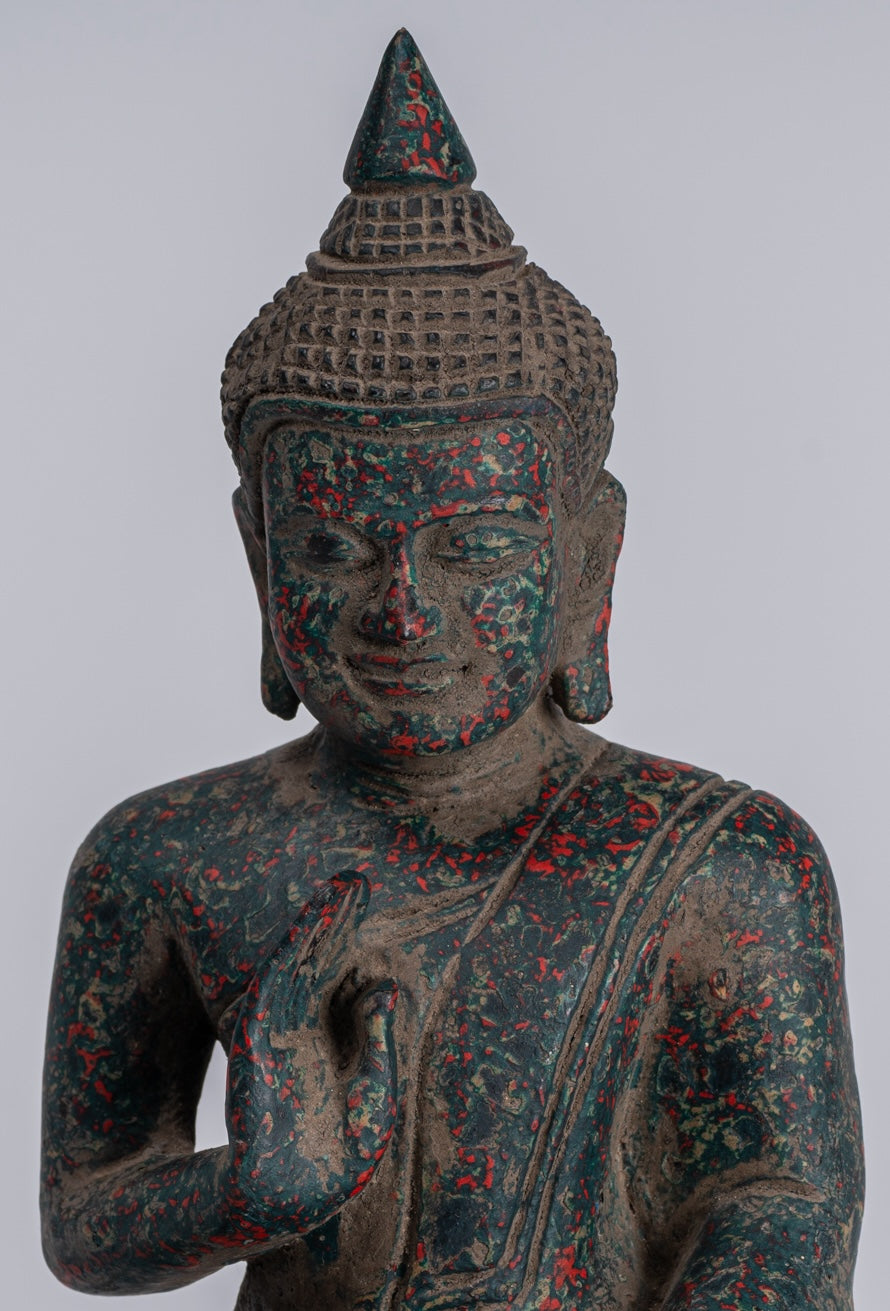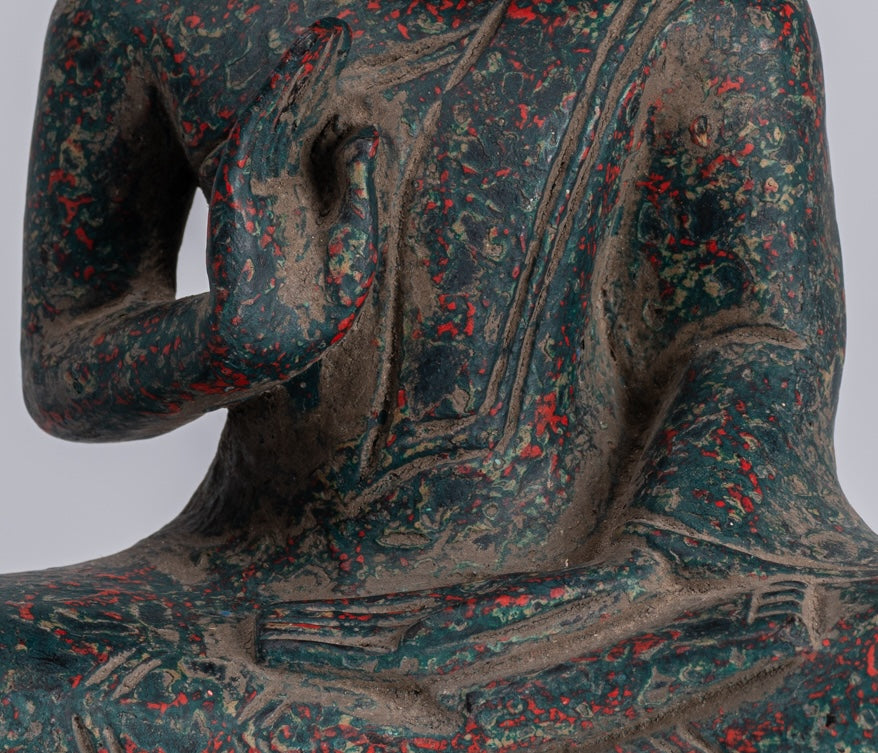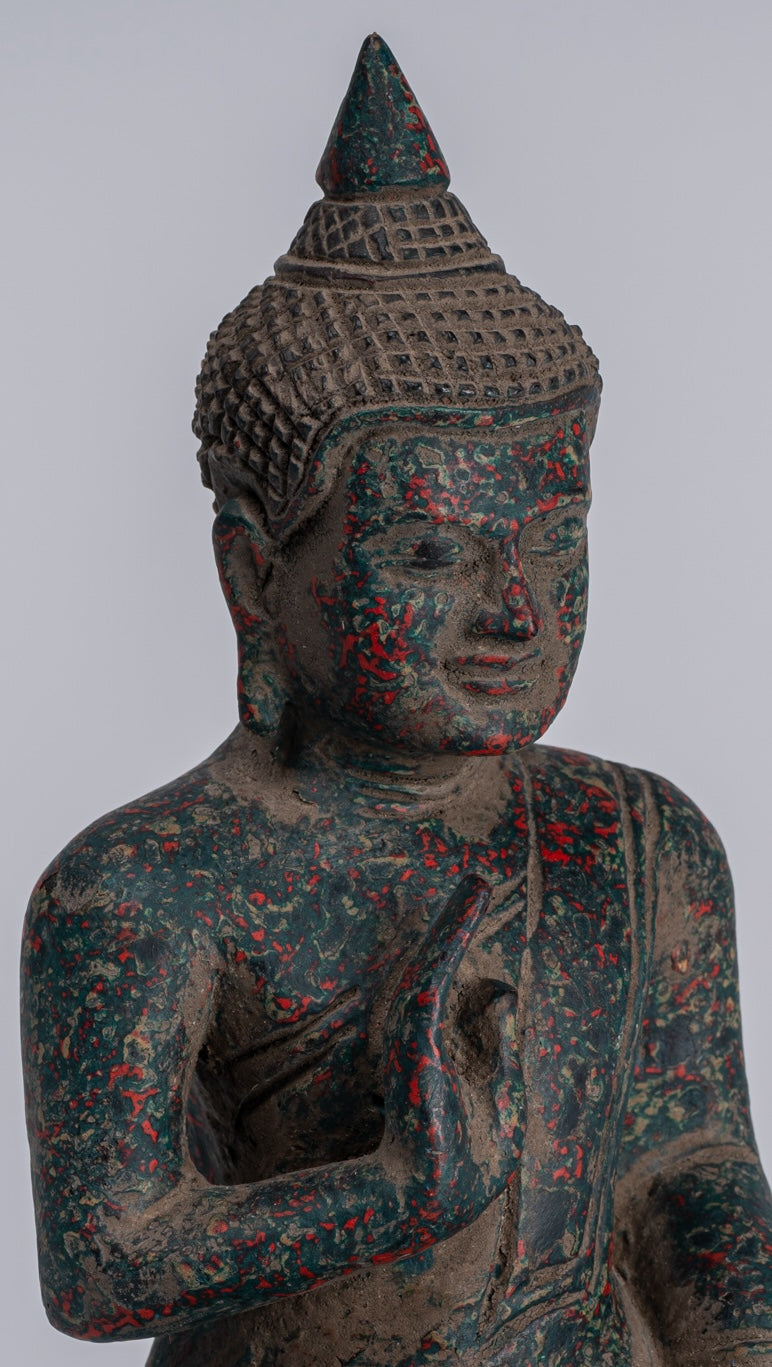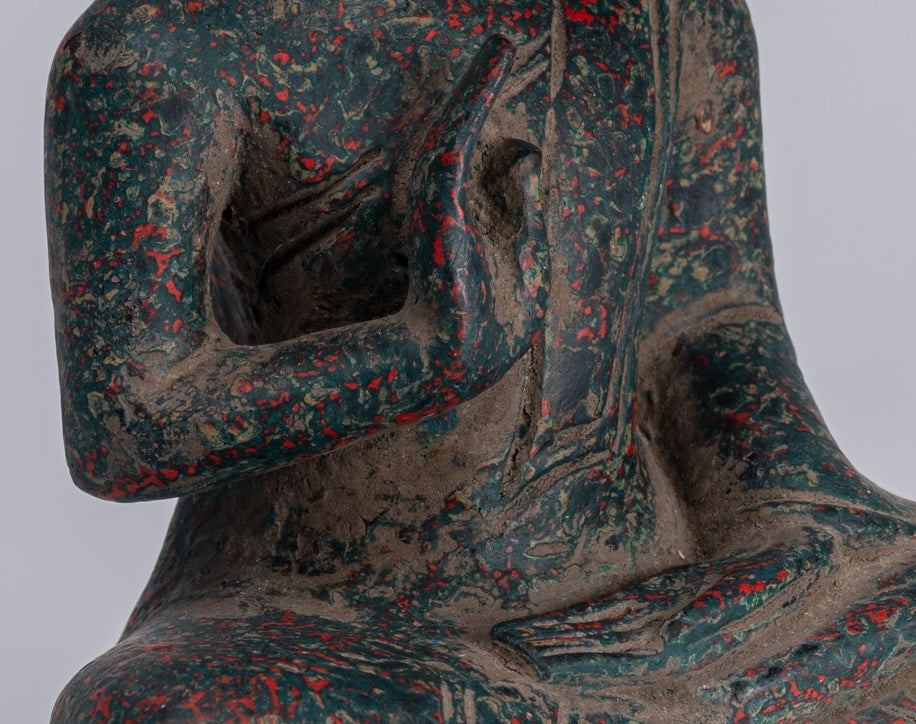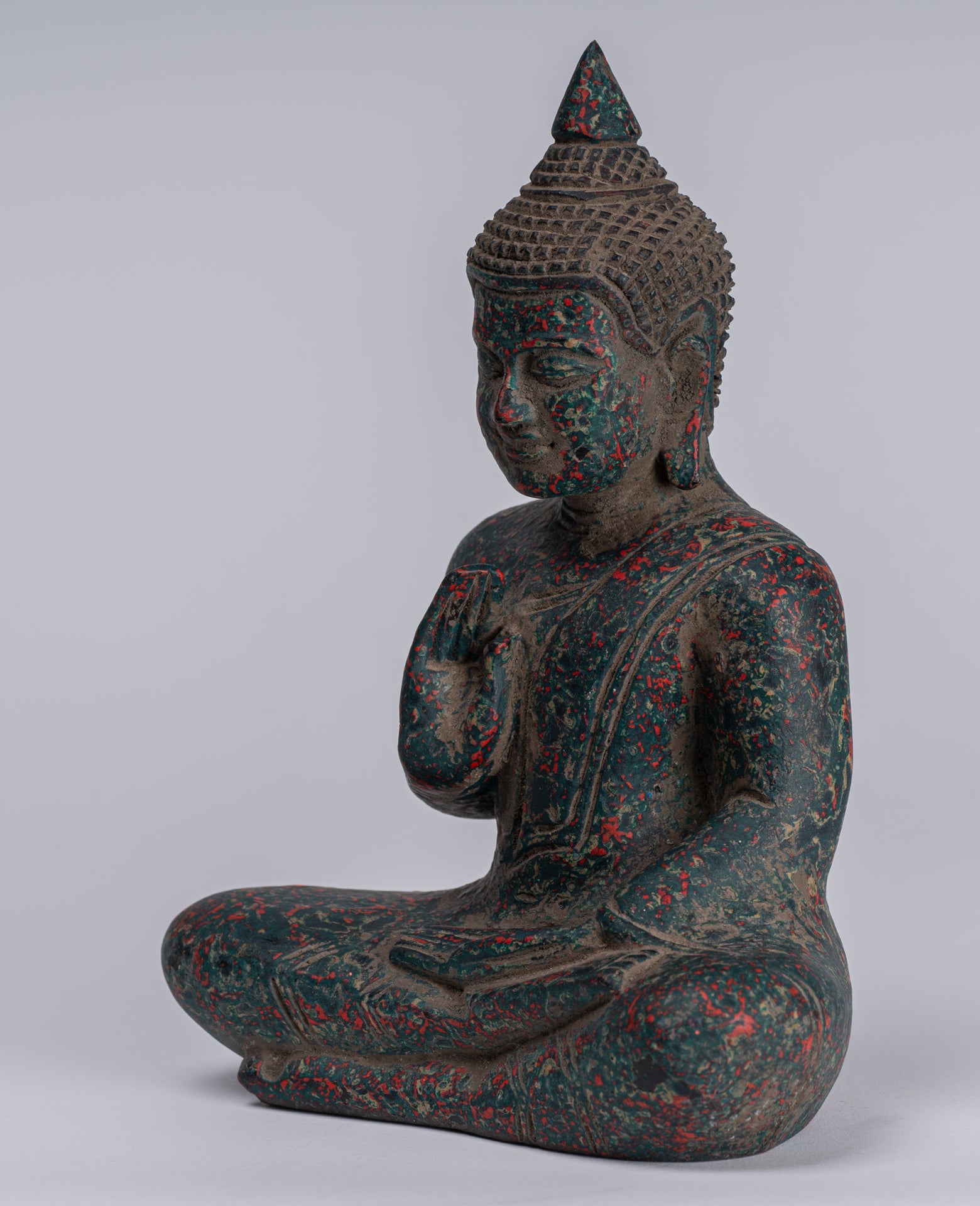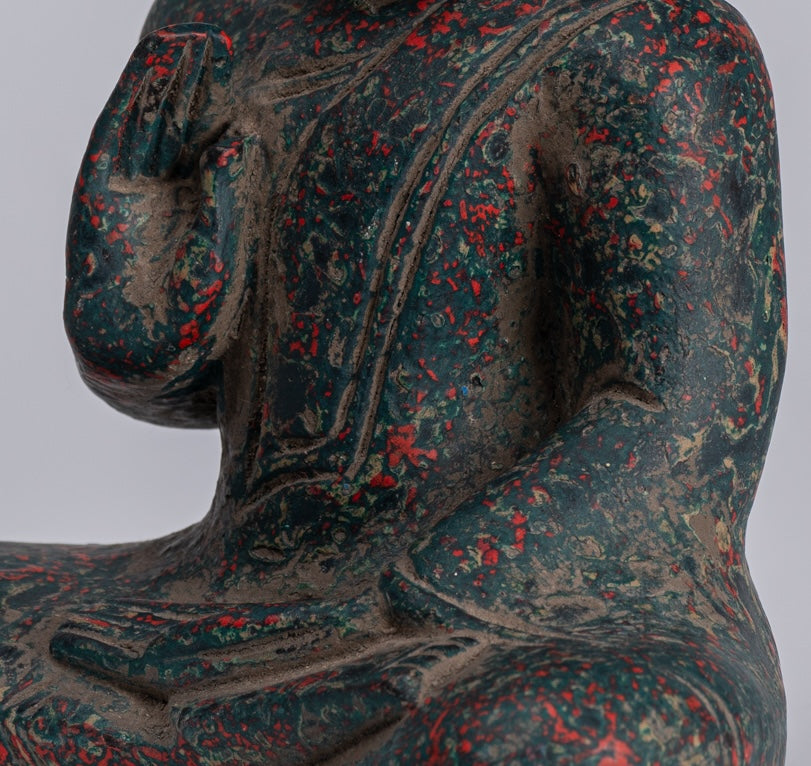-
Buddha Statue - Antique Khmer Style Cambodia Seated Wood Buddha Statue Teaching Mudra - 20cm/8"
Measures (Height) 20cm/8"
Antique Khmer style wood Buddha statue from Cambodia. The Buddha has a peaceful countenance with downcast introspective eyes and a firm brow.
The Teaching Buddha, also known as the Dharmachakra Mudra, is a central and revered image in Buddhism. This iconic representation of the Buddha carries profound meaning and symbolism within the context of Buddhist philosophy and practice.
The Buddha is seated in a state of meditative serenity. The bodies profile is with broad shoulders and slender waist, covered by a Sanghati robe worn diagonally over the left shoulder, and is graced by a heavily pleated flap draped to the navel. The right shoulder is left bare. The Buddha features an oval shaped face, with almond shaped downcast eyes. Curved eyebrows meet above a prominent nose, and contoured lips with an exalted expression, appear smiling.
The shell like curls of the hair form are surmounted by a lotus flower ushnisha, symbolising his high level of spiritual development. His earlobes are stretched long from a youth spent as a prince wearing heavy gold earrings.
The Buddha is seated in the half lotus position with his right hand raised in front of his chest in the dharmachakra mudra. In sanskrit dharmachakra means the 'Wheel of Dharma'. This mudra symbolises one of the most important moments in the life of Buddha, the occasion when he preached to his companions the first sermon after his Enlightenment in the Deer Park at Sarnath. It therefore denotes the setting into motion of the Wheel of the teaching of the Dharma. In this mudra the thumb and index finger of both hands touch at their tips to form a circle. This circle represents the Wheel of Dharma, or in metaphysical terms, the union of method and wisdom.
The Teaching Buddha, with its iconic gesture of turning the wheel of Dharma, encapsulates the essence of Buddhist philosophy and practice. It represents the Buddha's profound realization of the nature of suffering and his compassionate mission to guide others toward liberation.
The symbolism of this image serves as a source of inspiration and guidance for Buddhist practitioners worldwide, reminding them of the path of wisdom, compassion, and inner transformation that leads to the ultimate goal of enlightenment and liberation from suffering.
The carving is beautiful as you can see in the fine details of the face. Each detail is rendered perfectly. The distinctive patina of the piece is also particularly delightful.
The sculpture provides the perfect traditional in appearance Buddha to bring serenity and timeless style to your home, office or sacred space.
SATISFACTION GUARANTEE - We have been offering SE Asian Art for many years and are proud of the reputation we have developed for fair and honest listings. However, if for any reason, whatsoever, you are unhappy with your purchase please just let us know and we will provide a full refund. We want you to be 100% happy with your purchase.
-
The majority of orders will be shipped with DHL. This is a secure, express and fully tracked service.
Items less than 2Kg we typically ship using Royal Mail.
Once we receive your order we try to ship all orders the same or next working day.
Large and/or fragile pieces requiring palletising, specialist crating and/or extra packaging may take a little longer. Palletised shipments will be delivered curbside.
All orders over 35 GBP will be shipped free of charge.

-
We genuinely hope that all purchases delight.
However, if they do not, regardless of reason, we will refund all orders upon receipt of the unwanted item. Just notify us within 14 days of receiving your order that you wish to make a return and send the piece back to us with 30 days of delivery.
Let Us Help You Find The Piece You Desire
Let Us Help You Find The Piece You Desire
The large Teak Buddha face is a superb piece, and I also like the bronze black Cambodian Buddha head. Many thanks.
Ted, Auckland, New Zealand
I got the piece home in tact and it is really stunning. Many thanks.
Shelagh, London, UK
Oh, what a beautiful statue. She will be joined by my other Oriental statues - Buddha Kuan Yin Tara & Shiva.
I like them being a Buddhist for many years thank you again.Peter, Penzance, UK



